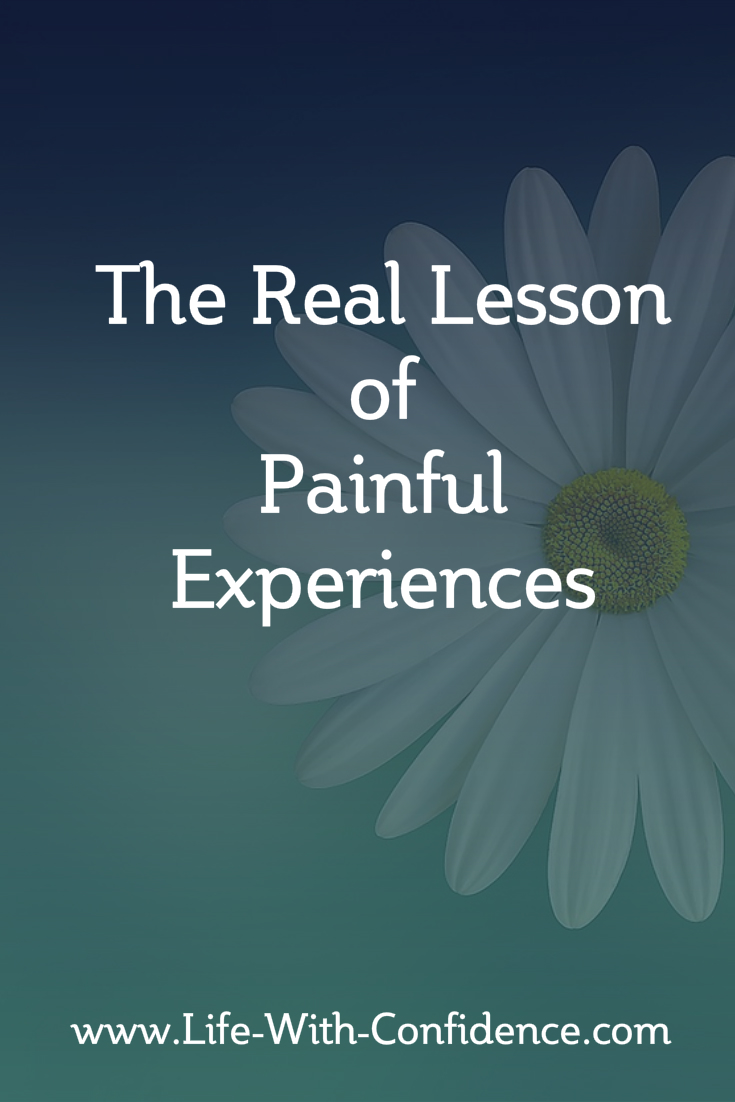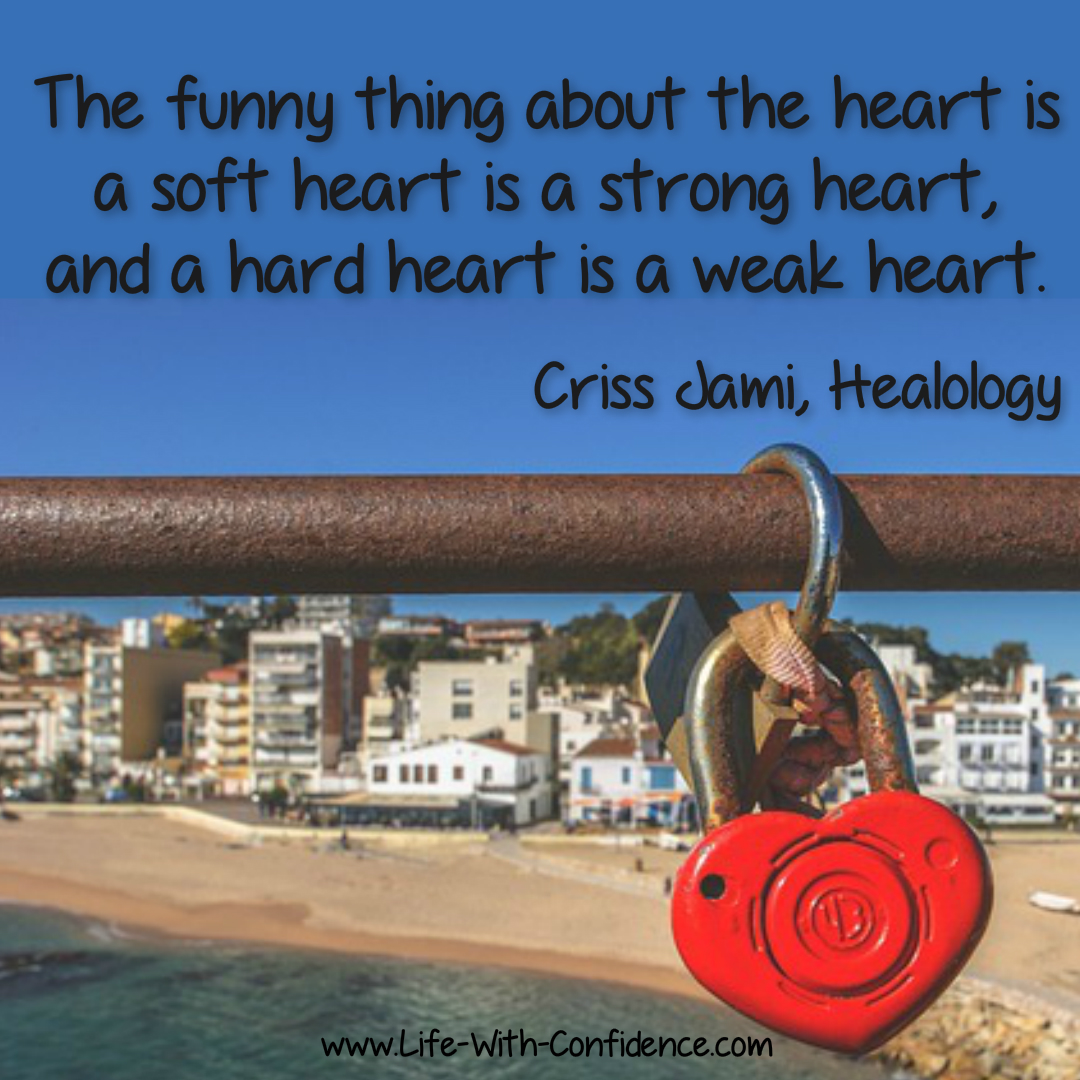The Real Lesson of Painful Experiences
by Catherine Pratt
www.Life-With-Confidence.com
Have you gone through a painful experience recently?
I just went through what I’ll call “a transformational moment” which is when an upsetting event happens but then afterwards you realize you’ve learned something incredibly valuable and gained a new perspective about yourself and the world.
This “lightbulb moment” ends up changing things for the better for you. Yes, they’re often painful at the beginning but it ends up being more than worth it in the end.
I won’t go into the gory details about what happened to me but basically someone who I thought was one of my best friends in the world turned out not to be. It had nothing to do with the other person but more me reading more into the relationship than was really there.
Anyway, as I go through this valuable growth lesson, I realized one of the most common reactions when first hitting any painful event is to withdraw, retreat, and lock up the heart to prevent any further hurt.
So, someone hurts you and your gut reaction might be to decide to withdraw not only from that person but all your other friends and family too. You’ve been wounded and it might even feel like it’s terribly unfair and that you’re being attacked by others and definitely misunderstood. You might also decide you’re going to do everything you can to avoid ever allowing yourself to be vulnerable like that again.
The tendency is to take one event and make it a moral lesson for your whole life. One person hurt you so you’ll never trust anyone else either thinking that will be the solution to never getting hurt again.
But, that isn’t meant to be the lesson. There’s always wisdom to be gained from any self-growth but the lesson will never be to harden your heart or to become a less trusting or caring person.
But, if you don’t pay attention to this reaction to wanting to
protect yourself from future pain, you may do it in a number of
different ways:
- When your pet dies, you may decide to never get another one because it’s too painful.
- A romantic relationship ends so you decide to never fall in
love again or allow yourself to be that vulnerable with anyone else.
- Someone cons you or rips you off so you decide the world is an unsafe place and you’re never going to trust anyone again.
- Someone hurts your feelings so you decide to always keep people at a distance from now on.
- Someone makes fun of you so you decide not to share any of your personal goals or dreams with anyone ever again.
- You spend a lot of time and effort to go the extra mile for
someone and it’s not even appreciated so you decide you’re not going to
help anyone
else in the future.
- You enter your artwork into a contest and you don’t even place
in the top ten so you decide that means you should give up on your
artwork completely.
- You have a bad experience in a store and decide to never go back.
So, instead of the transformation moment being something that frees you from previous limiting beliefs, you’ve instead added more to yourself.
Know that whatever the event was, it was just one lesson, one situation, and it was never intended to represent a hardening of your heart against the world.
So, one of the biggest learnings from these self-growth events we go through is figuring how to be able to endure the pain AND to make the conscious choice to keep being the same loving and kind person you are at your core.
People might hurt you but you need to figure out how to not let it make you bitter and angry at the world. Decide that the event isn’t going to change you from being true to yourself. And, if you can do that then you will make it through your self-growth learning just fine but also you will emerge even stronger and wiser than before the event happened.
You also won’t end causing yourself future problems by not being open or trusting in future relationships for example.
It’s not the easiest thing to do but one of the most brave things you can do is to decide to soften your heart and keep loving in spite of the pain.
Yes, if a friend does treat you badly, it means you may have to adjust how you behave with that person but that doesn’t mean you stop trusting everyone in the world. Or if you get ripped off by a phishing email it pays to become cautious and to learn not to click on links you don’t know but it doesn’t mean the entire world is out to get you.
Instead of letting painful moments make you feel like you need to retreat from the world, use them to become an even better version of yourself.
Here are some more tips to help you get through those painful self-growth moments:
1.
Allow yourself to feel all the emotions that the event stirs up
Everything
from anger to hurt to sadness to grief to loneliness. Feel them all.
Allow them to flow through you. Don’t get tangled up in them, just allow
yourself to feel them.
As part of this phase of the healing process, don’t try to justify the event, or explain things, or wish it hadn't happened, or think about how it could be fixed. That’s being logical about it. You most likely went through a logical phase when you first encountered the transformation event. You also need to go through a phase of just allowing yourself to feel all the emotions.
2. Don’t blame yourself for caring too much
You’re not
stupid for trusting someone or an idiot for loving someone. You might
learn that you can’t trust one particular person but the problem wasn’t
that you cared too much.
3. If you can, talk it out with a friend
It’s always helpful to be able
to express your feelings and thoughts to someone else and have a supportive shoulder to listen.
4. Become curious
Once you’ve gotten past the main
incident and re-playing in your mind what happened and why, then become
curious about the event and see if you can understand why you reacted
the way you did. Why do feel so angry or hurt? What’s really going on
behind the emotions?
5. Shake it off
Another way of letting your body know
you’re ready to let go of all the painful emotions can be to do some
form of exercise. If you’re able, do some form of exercise to shake it
off even if it’s just a walk around the block. Shake off all the tension
happening in your body for having gone through the experience. It’s
also a way of releasing any trapped emotions.
6. Be gentle with yourself
Let blame go whether it’s you blaming yourself or blaming the other person. Blame isn’t important. What’s
important is growing from the experience.
7. Consciously soften your heart
Allow love and caring and trust to fill your heart again so you can continue to interact with others in an open way.
But most of all learn from the lesson, grow in wisdom, and keep your heart open as you go forwards ever wiser and ever more believing in yourself for having made it through yet another transformation moment.
Additional Resources To Help You Through Painful Moments
• Forgiveness - Why is it so hard to do?
From other sites
• 10 Life Changing Facts to Heal The Pain of the Past
• 4 Steps To Let Go of Past Fears That Are Cursing You In the Present


